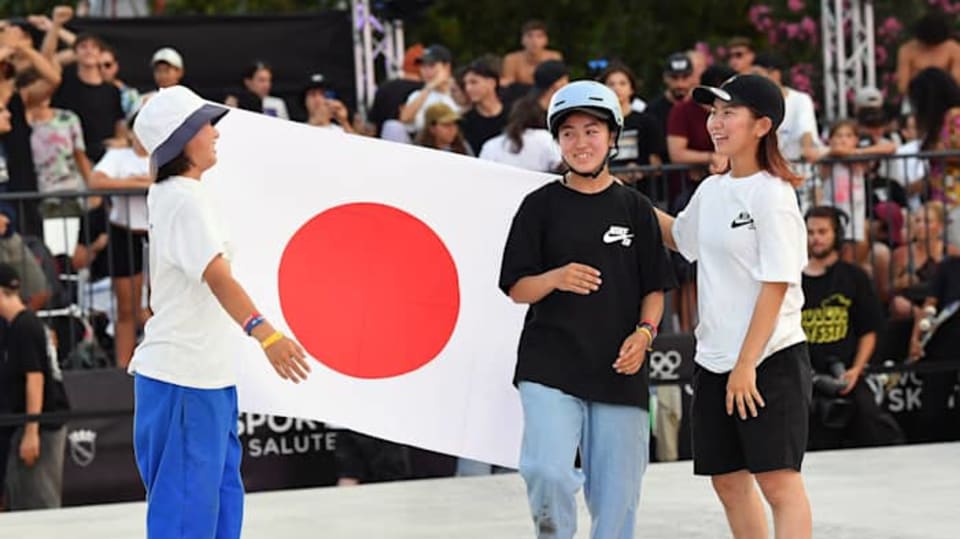
At Tokyo 2020 where skateboarding made its Olympic Games debut, Japan won three of the four disciplines in street and park combined, taking full advantage of being at home.
The Japanese onslaught on wheels virtually hasn’t stopped since. At the most recent world championships last year, they swept the men’s street and won gold and bronze in the women’s in Tokyo.
In park in Rome, their women capped a one-two. About the only event Japan haven’t regularly shown up on the podium is the men’s park, but you like to think it’s only a matter of time before they start running roughshod in that department.
How have the Japanese come to dominate the sport in the three years since the last Olympic Games? Is there a magic bullet lying on the Grassy Knoll somewhere?
If you ask Japan coach Hayakawa Daisuke, who has been on the front line with the skaters every step of the way, the seeds were sewn more than 10 years ago, with one seed standing out in particular.
A seed by the name of Horigome Yuto.
- Olympic Qualifier Series Shanghai 2024: Day 1 wrap-up
- Olympic men's street skateboarding champion Horigome Yuto: The ride of his life
- Skateboarding at OQS Shanghai: Preview, schedule and how to watch live
- Here are the athletes competing in park and street skateboarding at Olympic Qualifier Series
- Charting the course for Paris 2024: Qualification and points system for OQS
Japan coach Hayakawa Daisuke, left, is a witness to his country's rise in the skateboarding community.
The Sun also rises
“This didn’t happen overnight,” Hayakawa said in an interview with Olympics.com, when asked what the secret of his team’s success was - or if there was one. “I think the tide did turn around the Tokyo Olympics but the root of why Yuto was able to win a gold at the Olympics can be found 10 years ago, in 2013 when he joined my brand.
“Yuto said then that he wanted to be a world-class pro and from there walked the talk, did what it took. Up until then, Japanese professional skaters never ventured outside the country and were content with just being pros in Japan. For a long time, it was very difficult to skate internationally for a Japanese and the prospect of going abroad didn’t seem real.
“Then comes along someone like Yuto who is from a new generation with big dreams. Not like us who were part of a clique known as the Japanese skateboarding scene, but Internet literate kids accustomed to seeing what world class was through social media, YouTube and what not. They could now practise the tricks at the highest level if they wanted to.
“A new era was dawning on the horizon around 2010 and before those who were myopic could realise what was going on, these kids already had the world in their sights.”
While he is on the ropes as far as Paris 2024 qualification goes, Horigome has been Japan’s most successful skater to date without question, on and off the pavement. Hayakawa said Horigome, even in his mid-teens, was always a bit different from the rest with his vision and drive.
“I just happened to take on Yuto at the right time and was able to notice the transformation. The world was coming to their doorstep so why not let them go, namely to America. Now you have kids who were following Yuto’s movements wanting to be not No. 1 in Japan but No. 1 in the world - and that has been the most crucial change in Japanese skateboarding.
“In parallel with all this, skateboarding becomes a part of the Olympics. What follows is a conversion - the kids who were eyeing the world are now eyeing the Olympics, and the timing couldn’t have been better. Yuto wins gold, the girls who had been on the rise win medals like (Nishiya) Momiji, who won a gold herself.
“The growth of Japanese skateboarding and the Olympics crossed paths at just the right time.”
Tokyo 2020 men's street skateboarding gold medallist Horigome Yuto
Japan 'brought a lot of smiles back into it'
Niall Neeson, of skateboarding’s international governing body World Skate, believes the sport and the inherence and cultural dynamics of the Japanese fit like two peas in a pod, and that it cannot be easily mimicked.
Neeson insists there are layers as to why the country has done so well, one of the reasons being plain and simple - they actually like skateboarding.
“Because of its geographical size, street skating doesn’t really exist in Japan that it does elsewhere,” Neeson said. “Most of them come up skating in skate parks which isn’t to say that it’s institutionalised, but they learn the basics earlier in a way that isn’t necessarily true in the rest of the world.
“I used to think that it was the Japanese sense of learning and refining what other people do. It’s more about respect. They respect the opportunities that have been given to them. They respect the coaches, they respect the culture of skateboarding. And they all have smiles on their faces while they’re doing it. It’s more of a wholesome activity; it doesn’t have the outlaw edge in Japan.
“If there was a two-dimensional answer to it everybody else would be doing it. It’s not just hunger because the Brazilians are plenty hungry. It’s not just the time they put into it because there are a lot of other countries that have got bigger problems devoted to it including the Australians.
“To me, the thing about Japan is Japan grafts schools on other movements. There are Japanese schools in art. There are Japanese schools in jazz. And there are Japanese schools in skateboarding.
“They brought a lot of smiles back into it. There’s been a lot more sunshine around them whenever they’re there - particularly the young Japanese women. They bring a lot of happiness to it. You can’t really say that about a lot of them. A lot of them are eye of the tiger. But the Japanese seem to enjoy one another’s company.”
Hayakawa Daisuke: 'We want to win medals and we expect it'
When Hayakawa decided to mentor young Horigome, he felt the best opportunity to carve out a path for him to the US was through contests.
“What I set out to do in order for Yuto to succeed in America was to get him into contests. There’s a certain code you have to obey in getting around the skateboarding world but everyone has a chance in contests.
“If you’re a young no-name from Japan it’s going to be difficult to cut it in the US. But it’s a level playing field in contests. If you’re from out of town and nobody knows you but you can dominate a contest, people will take notice - and those were the type of opportunities we looked for, which led to us aiming for the Tampa Am.”
That led to Tampa Am organisers bringing a qualifying event to Japan, the first of which was held in 2018 and won by Shirai Sora, the current world No. 1 in the men’s street Olympic qualifying race.
Hayakawa is convinced that contest helped take them to a whole another level.
“The kids who could only compete in Japan now had a shot to go directly to America from their own backyard. Everyone was so into it and it significantly raised the average mean of Japanese skaters.
“Japan’s ceiling went up. We were among the world’s elite now.”
And the rest is history as we know it. The frightening aspect is, Hayakawa says there is still plenty of room to improve for Japanese skateboarding. Not so much the athletes themselves but the scene in general, from practice facilities to judges to the officialdom running the sport.
Hayakawa expects the medals to keep on coming in Paris this summer but just as much, he wants his skaters to be able to communicate all that is good about skateboarding to further embed it into the national psyche.
“Of course we want to win medals and we expect it. We are ticking off all the boxes but I want our skaters to be more than just about contests. I want them to be able to articulate what the culture is all about. That’s what I’d like to develop.”

